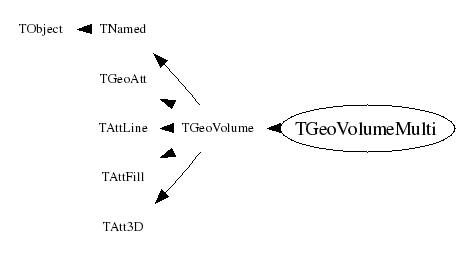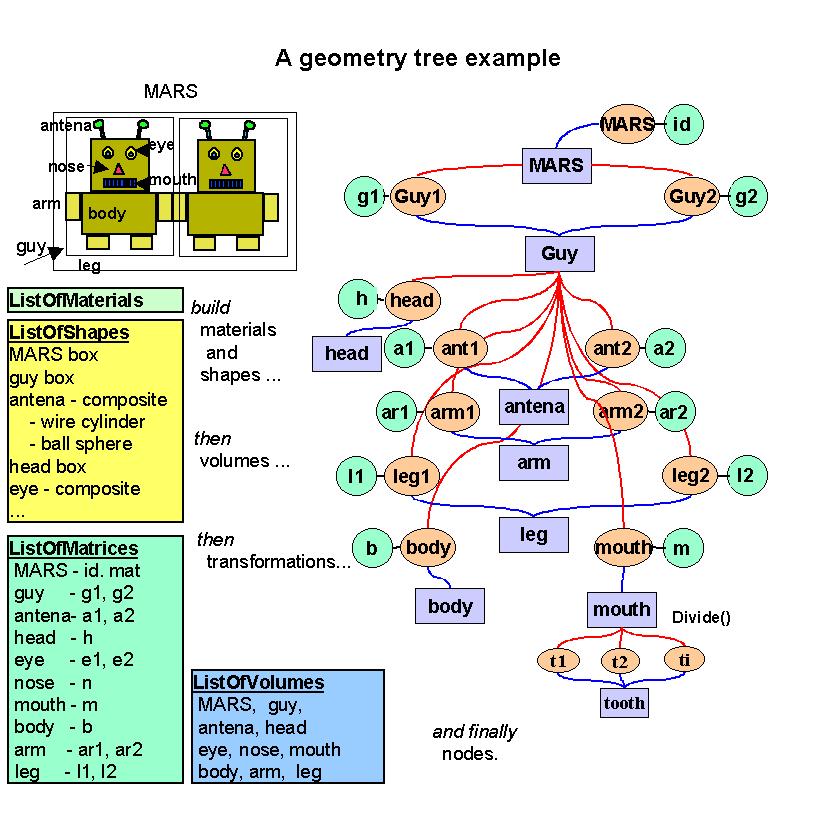| TGeoVolumeMulti() |
| TGeoVolumeMulti(const char* name, const TGeoMedium* med = 0) |
| virtual | ~TGeoVolumeMulti() |
| void | TObject::AbstractMethod(const char* method) const |
| virtual void | AddNode(const TGeoVolume* vol, Int_t copy_no, TGeoMatrix* mat, Option_t* option = "") |
| void | TGeoVolume::AddNodeOffset(const TGeoVolume* vol, Int_t copy_no, Double_t offset = 0, Option_t* option = "") |
| virtual void | AddNodeOverlap(const TGeoVolume* vol, Int_t copy_no, TGeoMatrix* mat, Option_t* option = "") |
| void | AddVolume(TGeoVolume* vol) |
| virtual void | TObject::AppendPad(Option_t* option = "") |
| virtual void | TGeoVolume::Browse(TBrowser* b) |
| Double_t | TGeoVolume::Capacity() const |
| virtual void | TGeoVolume::cd(Int_t inode) const |
| void | TGeoVolume::CheckGeometry(Int_t nrays = 1, Double_t startx = 0, Double_t starty = 0, Double_t startz = 0) const |
| void | TGeoVolume::CheckOverlaps(Double_t ovlp = 0.1, Option_t* option = "") const |
| void | TGeoVolume::CheckShapes() |
| static TClass* | Class() |
| virtual const char* | TObject::ClassName() const |
| void | TGeoVolume::CleanAll() |
| virtual void | TNamed::Clear(Option_t* option = "") |
| void | TGeoVolume::ClearNodes() |
| void | TGeoVolume::ClearShape() |
| virtual TObject* | TNamed::Clone(const char* newname = "") const |
| void | TGeoVolume::CloneNodesAndConnect(TGeoVolume* newmother) const |
| virtual TGeoVolume* | TGeoVolume::CloneVolume() const |
| virtual Int_t | TNamed::Compare(const TObject* obj) const |
| Bool_t | TGeoVolume::Contains(Double_t* point) const |
| virtual void | TNamed::Copy(TObject& named) const |
| Int_t | TGeoVolume::CountNodes(Int_t nlevels = 1000, Int_t option = 0) |
| virtual void | TObject::Delete(Option_t* option = "") |
| Int_t | TAttLine::DistancetoLine(Int_t px, Int_t py, Double_t xp1, Double_t yp1, Double_t xp2, Double_t yp2) |
| virtual Int_t | TGeoVolume::DistancetoPrimitive(Int_t px, Int_t py) |
| virtual TGeoVolume* | Divide(const char* divname, Int_t iaxis, Int_t ndiv, Double_t start, Double_t step, Int_t numed = 0, Option_t* option = "") |
| virtual void | TGeoVolume::Draw(Option_t* option = "") |
| virtual void | TObject::DrawClass() const |
| virtual TObject* | TObject::DrawClone(Option_t* option = "") const |
| virtual void | TGeoVolume::DrawOnly(Option_t* option = "") |
| virtual void | TObject::Dump() const |
| virtual void | TObject::Error(const char* method, const char* msgfmt) const |
| virtual void | TObject::Execute(const char* method, const char* params, Int_t* error = 0) |
| virtual void | TObject::Execute(TMethod* method, TObjArray* params, Int_t* error = 0) |
| virtual void | TGeoVolume::ExecuteEvent(Int_t event, Int_t px, Int_t py) |
| Int_t | TGeoVolume::Export(const char* filename, const char* name = "", Option_t* option = "") |
| virtual void | TObject::Fatal(const char* method, const char* msgfmt) const |
| virtual void | TNamed::FillBuffer(char*& buffer) |
| Bool_t | TGeoVolume::FindMatrixOfDaughterVolume(TGeoVolume* vol) const |
| TGeoNode* | TGeoVolume::FindNode(const char* name) const |
| virtual TObject* | TObject::FindObject(const char* name) const |
| virtual TObject* | TObject::FindObject(const TObject* obj) const |
| void | TGeoVolume::FindOverlaps() const |
| Int_t | GetAxis() const |
| virtual Int_t | TGeoVolume::GetByteCount() const |
| virtual Int_t | TGeoVolume::GetCurrentNodeIndex() const |
| virtual Option_t* | TObject::GetDrawOption() const |
| static Long_t | TObject::GetDtorOnly() |
| TObject* | TGeoVolume::GetField() const |
| virtual Color_t | TAttFill::GetFillColor() const |
| virtual Style_t | TAttFill::GetFillStyle() const |
| TGeoPatternFinder* | TGeoVolume::GetFinder() const |
| TGeoManager* | TGeoVolume::GetGeoManager() const |
| virtual const char* | TGeoVolume::GetIconName() const |
| Int_t | TGeoVolume::GetIndex(const TGeoNode* node) const |
| TGeoShape* | GetLastShape() const |
| virtual Color_t | TAttLine::GetLineColor() const |
| virtual Style_t | TAttLine::GetLineStyle() const |
| virtual Width_t | TAttLine::GetLineWidth() const |
| TGeoMaterial* | TGeoVolume::GetMaterial() const |
| TGeoMedium* | TGeoVolume::GetMedium() const |
| virtual const char* | TNamed::GetName() const |
| Int_t | TGeoVolume::GetNdaughters() const |
| Int_t | GetNdiv() const |
| virtual Int_t | TGeoVolume::GetNextNodeIndex() const |
| TGeoNode* | TGeoVolume::GetNode(const char* name) const |
| TGeoNode* | TGeoVolume::GetNode(Int_t i) const |
| Int_t | TGeoVolume::GetNodeIndex(const TGeoNode* node, Int_t* check_list, Int_t ncheck) const |
| TObjArray* | TGeoVolume::GetNodes() |
| Int_t | TGeoVolume::GetNtotal() const |
| Int_t | TGeoVolume::GetNumber() const |
| Int_t | GetNvolumes() const |
| virtual char* | TGeoVolume::GetObjectInfo(Int_t px, Int_t py) const |
| static Bool_t | TObject::GetObjectStat() |
| Bool_t | TGeoVolume::GetOptimalVoxels() const |
| virtual Option_t* | TGeoVolume::GetOption() const |
| char* | TGeoVolume::GetPointerName() const |
| TGeoShape* | TGeoVolume::GetShape() const |
| Double_t | GetStart() const |
| Double_t | GetStep() const |
| virtual const char* | TNamed::GetTitle() const |
| Char_t | TGeoVolume::GetTransparency() const |
| virtual UInt_t | TObject::GetUniqueID() const |
| TGeoVolume* | GetVolume(Int_t id) const |
| TGeoVoxelFinder* | TGeoVolume::GetVoxels() const |
| void | TGeoVolume::GrabFocus() |
| void | TGeoVolume::Gsord(Int_t) |
| virtual Bool_t | TObject::HandleTimer(TTimer* timer) |
| virtual ULong_t | TNamed::Hash() const |
| static TGeoVolume* | TGeoVolume::Import(const char* filename, const char* name = "", Option_t* option = "") |
| virtual void | TObject::Info(const char* method, const char* msgfmt) const |
| virtual Bool_t | TObject::InheritsFrom(const char* classname) const |
| virtual Bool_t | TObject::InheritsFrom(const TClass* cl) const |
| virtual void | TObject::Inspect() const |
| void | TGeoVolume::InspectMaterial() const |
| void | TGeoVolume::InspectShape() const |
| void | TObject::InvertBit(UInt_t f) |
| void | TGeoVolume::InvisibleAll(Bool_t flag = kTRUE) |
| virtual TClass* | IsA() const |
| Bool_t | TGeoVolume::IsActive() const |
| Bool_t | TGeoVolume::IsActiveDaughters() const |
| Bool_t | TGeoVolume::IsAdded() const |
| Bool_t | TGeoVolume::IsAllInvisible() const |
| virtual Bool_t | TGeoVolume::IsAssembly() const |
| Bool_t | TGeoVolume::IsCylVoxels() const |
| virtual Bool_t | TObject::IsEqual(const TObject* obj) const |
| virtual Bool_t | TGeoVolume::IsFolder() const |
| Bool_t | TObject::IsOnHeap() const |
| Bool_t | TGeoVolume::IsRaytracing() const |
| Bool_t | TGeoVolume::IsReplicated() const |
| Bool_t | TGeoVolume::IsRunTime() const |
| Bool_t | TGeoVolume::IsSelected() const |
| virtual Bool_t | TNamed::IsSortable() const |
| Bool_t | TGeoVolume::IsStyleDefault() const |
| Bool_t | TGeoVolume::IsTopVolume() const |
| virtual Bool_t | TAttFill::IsTransparent() const |
| Bool_t | TGeoVolume::IsValid() const |
| Bool_t | TGeoAtt::IsVisBranch() const |
| Bool_t | TGeoVolume::IsVisContainers() const |
| Bool_t | TGeoAtt::IsVisDaughters() const |
| virtual Bool_t | TGeoVolume::IsVisible() const |
| Bool_t | TGeoVolume::IsVisibleDaughters() const |
| Bool_t | TGeoVolume::IsVisLeaves() const |
| Bool_t | TGeoVolume::IsVisOnly() const |
| Bool_t | TGeoAtt::IsVisRaytrace() const |
| Bool_t | TGeoAtt::IsVisStreamed() const |
| Bool_t | TGeoAtt::IsVisTouched() const |
| virtual Bool_t | IsVolumeMulti() const |
| Bool_t | TGeoVolume::IsXYZVoxels() const |
| Bool_t | TObject::IsZombie() const |
| TH2F* | TGeoVolume::LegoPlot(Int_t ntheta = 20, Double_t themin = 0., Double_t themax = 180., Int_t nphi = 60, Double_t phimin = 0., Double_t phimax = 360., Double_t rmin = 0., Double_t rmax = 9999999, Option_t* option = "") |
| virtual void | TNamed::ls(Option_t* option = "") const |
| void | TGeoVolume::MakeCopyNodes(const TGeoVolume* other) |
| virtual TGeoVolume* | MakeCopyVolume(TGeoShape* newshape) |
| TGeoVolume* | TGeoVolume::MakeReflectedVolume(const char* newname = "") const |
| void | TObject::MayNotUse(const char* method) const |
| virtual void | TAttLine::Modify() |
| virtual Bool_t | TObject::Notify() |
| static void | TObject::operator delete(void* ptr) |
| static void | TObject::operator delete(void* ptr, void* vp) |
| static void | TObject::operator delete[](void* ptr) |
| static void | TObject::operator delete[](void* ptr, void* vp) |
| void* | TObject::operator new(size_t sz) |
| void* | TObject::operator new(size_t sz, void* vp) |
| void* | TObject::operator new[](size_t sz) |
| void* | TObject::operator new[](size_t sz, void* vp) |
| Bool_t | TGeoVolume::OptimizeVoxels() |
| virtual void | TGeoVolume::Paint(Option_t* option = "") |
| virtual void | TObject::Pop() |
| virtual void | TNamed::Print(Option_t* option = "") const |
| void | TGeoVolume::PrintNodes() const |
| void | TGeoVolume::PrintVoxels() const |
| void | TGeoVolume::RandomPoints(Int_t npoints = 1000000, Option_t* option = "") |
| void | TGeoVolume::RandomRays(Int_t nrays = 10000, Double_t startx = 0, Double_t starty = 0, Double_t startz = 0) |
| void | TGeoVolume::Raytrace(Bool_t flag = kTRUE) |
| virtual Int_t | TObject::Read(const char* name) |
| virtual void | TObject::RecursiveRemove(TObject* obj) |
| void | TGeoVolume::RegisterYourself(Option_t* option = "") |
| void | TGeoVolume::RemoveNode(TGeoNode* node) |
| TGeoNode* | TGeoVolume::ReplaceNode(TGeoNode* nodeorig, TGeoShape* newshape = 0, TGeoMatrix* newpos = 0, TGeoMedium* newmed = 0) |
| void | TGeoAtt::ResetAttBit(UInt_t f) |
| virtual void | TAttFill::ResetAttFill(Option_t* option = "") |
| virtual void | TAttLine::ResetAttLine(Option_t* option = "") |
| void | TObject::ResetBit(UInt_t f) |
| virtual void | TGeoVolume::SaveAs(const char* filename, Option_t* option = "") const |
| virtual void | TAttFill::SaveFillAttributes(ostream& out, const char* name, Int_t coldef = 1, Int_t stydef = 1001) |
| virtual void | TAttLine::SaveLineAttributes(ostream& out, const char* name, Int_t coldef = 1, Int_t stydef = 1, Int_t widdef = 1) |
| virtual void | TGeoVolume::SavePrimitive(ostream& out, Option_t* option = "") |
| void | TGeoVolume::SelectVolume(Bool_t clear = kFALSE) |
| void | TGeoVolume::SetActiveDaughters(Bool_t flag = kTRUE) |
| void | TGeoVolume::SetActivity(Bool_t flag = kTRUE) |
| void | TGeoVolume::SetAdded() |
| void | TGeoVolume::SetAsTopVolume() |
| void | TGeoAtt::SetAttBit(UInt_t f) |
| void | TGeoAtt::SetAttBit(UInt_t f, Bool_t set) |
| void | TGeoVolume::SetAttVisibility(Bool_t vis) |
| void | TObject::SetBit(UInt_t f) |
| void | TObject::SetBit(UInt_t f, Bool_t set) |
| void | TGeoVolume::SetCurrentPoint(Double_t x, Double_t y, Double_t z) |
| void | TGeoVolume::SetCylVoxels(Bool_t flag = kTRUE) |
| virtual void | TObject::SetDrawOption(Option_t* option = "") |
| static void | TObject::SetDtorOnly(void* obj) |
| void | TGeoVolume::SetField(const TObject* field) |
| virtual void | TAttFill::SetFillAttributes() |
| virtual void | TAttFill::SetFillColor(Color_t fcolor) |
| virtual void | TAttFill::SetFillStyle(Style_t fstyle) |
| void | TGeoVolume::SetFinder(const TGeoPatternFinder* finder) |
| void | TGeoVolume::SetInvisible() |
| virtual void | TAttLine::SetLineAttributes() |
| virtual void | SetLineColor(Color_t lcolor) |
| virtual void | SetLineStyle(Style_t lstyle) |
| virtual void | SetLineWidth(Width_t lwidth) |
| virtual void | SetMedium(const TGeoMedium* medium) |
| virtual void | TNamed::SetName(const char* name) |
| virtual void | TNamed::SetNameTitle(const char* name, const char* title) |
| void | TGeoVolume::SetNodes(TObjArray* nodes) |
| void | TGeoVolume::SetNtotal(Int_t ntotal) |
| void | TGeoVolume::SetNumber(Int_t number) |
| static void | TObject::SetObjectStat(Bool_t stat) |
| void | TGeoAtt::SetOptimization(Option_t* option) |
| void | TGeoVolume::SetOption(const char* option) |
| void | TGeoVolume::SetReplicated() |
| void | TGeoVolume::SetShape(const TGeoShape* shape) |
| virtual void | TNamed::SetTitle(const char* title = "") |
| void | TGeoVolume::SetTransparency(Char_t transparency = 0) |
| virtual void | TObject::SetUniqueID(UInt_t uid) |
| void | TGeoAtt::SetVisBranch() |
| virtual void | TGeoVolume::SetVisContainers(Bool_t flag = kTRUE) |
| void | TGeoAtt::SetVisDaughters(Bool_t vis = kTRUE) |
| virtual void | SetVisibility(Bool_t vis = kTRUE) |
| virtual void | TGeoVolume::SetVisLeaves(Bool_t flag = kTRUE) |
| virtual void | TGeoVolume::SetVisOnly(Bool_t flag = kTRUE) |
| void | TGeoAtt::SetVisRaytrace(Bool_t flag = kTRUE) |
| void | TGeoAtt::SetVisStreamed(Bool_t vis = kTRUE) |
| void | TGeoAtt::SetVisTouched(Bool_t vis = kTRUE) |
| void | TGeoVolume::SetVoxelFinder(const TGeoVoxelFinder* finder) |
| virtual void | ShowMembers(TMemberInspector& insp, char* parent) |
| virtual Int_t | TNamed::Sizeof() const |
| virtual void | TAtt3D::Sizeof3D() const |
| void | TGeoVolume::SortNodes() |
| virtual void | Streamer(TBuffer& b) |
| void | StreamerNVirtual(TBuffer& b) |
| virtual void | TObject::SysError(const char* method, const char* msgfmt) const |
| Bool_t | TGeoAtt::TestAttBit(UInt_t f) const |
| Bool_t | TObject::TestBit(UInt_t f) const |
| Int_t | TObject::TestBits(UInt_t f) const |
| void | TGeoVolume::UnmarkSaved() |
| virtual void | TObject::UseCurrentStyle() |
| Bool_t | TGeoVolume::Valid() const |
| void | TGeoVolume::VisibleDaughters(Bool_t vis = kTRUE) |
| void | TGeoVolume::Voxelize(Option_t* option) |
| virtual void | TObject::Warning(const char* method, const char* msgfmt) const |
| Double_t | TGeoVolume::Weight(Double_t precision = 0.01, Option_t* option = "va") |
| Double_t | TGeoVolume::WeightA() const |
| virtual Int_t | TObject::Write(const char* name = "0", Int_t option = 0, Int_t bufsize = 0) |
| virtual Int_t | TObject::Write(const char* name = "0", Int_t option = 0, Int_t bufsize = 0) const |


 */
*/